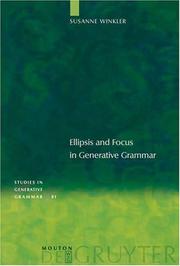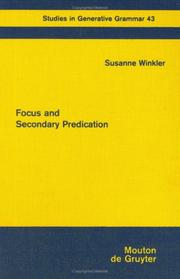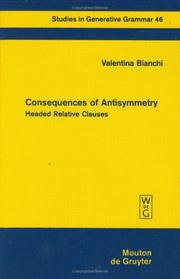| Listing 1 - 10 of 19 | << page >> |
Sort by
|
Book

ISBN: 3110126265 3110889374 9783110889376 9783110126266 Year: 2011 Volume: 85 Publisher: Berlin Boston
Abstract | Keywords | Export | Availability | Bookmark
 Loading...
Loading...Choose an application
- Reference Manager
- EndNote
- RefWorks (Direct export to RefWorks)
No detailed description available for "Autolexical Theory".
Autolexical theory (Linguistics) --- Generative grammar. --- Grammar, Comparative and general --- Grammar, Generative --- Grammar, Transformational --- Grammar, Transformational generative --- Transformational generative grammar --- Transformational grammar --- Psycholinguistics --- Generative grammar --- Derivation
Book
ISBN: 9789027255600 9027255601 9789027287052 9027287058 1283122057 9781283122054 9786613122056 661312205X Year: 2011 Publisher: Amsterdam ; Philadelphia : John Benjamins Pub. Co.,
Abstract | Keywords | Export | Availability | Bookmark
 Loading...
Loading...Choose an application
- Reference Manager
- EndNote
- RefWorks (Direct export to RefWorks)
This monograph addresses two issues, phases and adverbials. It proposes that there is a correlation between the phase structure, the tripartite quantificational structure and the information structure of the sentence. This correlation plays an important role not only in referential and information-structural properties of arguments and the verb but also in adverbial properties. For instance, the study shows that certain sentence adverbials can occur in the sentence-final position in the vP phase when they represent the extreme value with respect to the set of focus alternatives. The proposed correlation also becomes important in anaphoric relations with respect to adjuncts. Only an R-expression spelled out and interpreted in the CP phase of an adjunct clause can corefer with the coindexed pronoun. The study also discusses adverbial ordering and shows that the relative order of certain adverbials can be reversed if they occur in different phases. The monograph will appeal to syntacticians and linguists interested in the relationship between syntax and its interfaces.
Grammar, Comparative and general --- Generative grammar. --- Grammar, Generative --- Grammar, Transformational --- Grammar, Transformational generative --- Transformational generative grammar --- Transformational grammar --- Psycholinguistics --- Adverbials --- Adverbials. --- Derivation --- Linguistics --- Philology
Book

ISBN: 1283429950 9786613429957 3112189337 3110238713 9783110238716 3110238705 9783110238709 Year: 2011 Publisher: Berlin Boston
Abstract | Keywords | Export | Availability | Bookmark
 Loading...
Loading...Choose an application
- Reference Manager
- EndNote
- RefWorks (Direct export to RefWorks)
Most natural languages display an inventory of pronominal elements that obligatorily or optionally remain phonologically null in a few, in many or even in all syntactic surroundings. The authors of the papers compiled in this book analyse such null pronouns in a synchronic and diachronic way and recover the specific morphological and syntactic prerequisites for their origin and insertion.
Grammar, Comparative and general --- Generative grammar. --- Grammar, Generative --- Grammar, Transformational --- Grammar, Transformational generative --- Transformational generative grammar --- Transformational grammar --- Psycholinguistics --- Pronouns --- Pronoun. --- Derivation --- Function words --- Nominals --- Reflexives --- Linguistics --- Philology --- Morphology. --- Pronouns. --- Syntax.
Book
ISBN: 9780230280939 Year: 2011 Publisher: Basingstoke Palgrave Macmillan
Abstract | Keywords | Export | Availability | Bookmark
 Loading...
Loading...Choose an application
- Reference Manager
- EndNote
- RefWorks (Direct export to RefWorks)
Book
ISBN: 9789027208224 9789027286987 9027208220 9027286981 1283174928 9786613174925 9781283174923 6613174920 Year: 2011 Publisher: Amsterdam Benjamins
Abstract | Keywords | Export | Availability | Bookmark
 Loading...
Loading...Choose an application
- Reference Manager
- EndNote
- RefWorks (Direct export to RefWorks)
This article focuses on the distribution and interpretation of resumption in Jordanian Arabic with respect to a well-known distinction: weak (clitics and doubled pronouns) versus strong (strong pronouns and epithets) resumption. We propose an analysis of resumption and reconstruction that relates two major asymmetries with respect to that distinction, (i) strong resumption banning QP antecedents in non-island contexts, contrary to weak resumption, and (ii) strong resumption banning reconstruction in strong island contexts, contrary to weak resumption. Our main conclusion is that weak (functional) resumptives support two distributive readings, either bound variable or e- type, whereas strong (lexical) resumptives can only get an e-type interpretation. The asymmetries stated above then just follow from further constraints on the two distributive readings.
Grammar --- Grammar, Comparative and general --- Generative grammar. --- Pronoun. --- LANGUAGE ARTS & DISCIPLINES --- Linguistics / General --- Generative grammar --- Languages & Literatures --- Philology & Linguistics --- Pronoun --- Grammar, Generative --- Grammar, Transformational --- Grammar, Transformational generative --- Transformational generative grammar --- Transformational grammar --- Pronouns --- Derivation --- Psycholinguistics --- Function words --- Nominals --- Reflexives --- E-books --- Conferences - Meetings --- Linguistics --- Philology
Book
ISBN: 3484302879 311135573X 9783484302877 Year: 2011 Volume: 287 Publisher: Tübingen : Max Niemeyer Verlag, Max Niemeyer Verlag,
Abstract | Keywords | Export | Availability | Bookmark
 Loading...
Loading...Choose an application
- Reference Manager
- EndNote
- RefWorks (Direct export to RefWorks)
Projektion Und Linking: Ein Prinzipienbasierter Parser F RS Deutsche.
Generative grammar. --- Parsing (Computer grammar) --- Principles and parameters (Linguistics) --- German language --- Grammar, Generative. --- Parsing --- German language - Grammar, Generative. --- Grammar, Comparative and general --- Grammar, Generative --- Grammar, Transformational --- Grammar, Transformational generative --- Transformational generative grammar --- Transformational grammar --- Psycholinguistics --- Generative grammar --- Parsers (Computer grammar) --- Computational linguistics --- Formal languages --- Derivation
Book
ISBN: 9781107005556 9780511794278 9781316606483 9781139078658 1139078658 0511794274 1107005558 9781139080927 113908092X 1107221331 1139063944 Year: 2011 Publisher: Cambridge, UK New York Cambridge University Press
Abstract | Keywords | Export | Availability | Bookmark
 Loading...
Loading...Choose an application
- Reference Manager
- EndNote
- RefWorks (Direct export to RefWorks)
"While there has been a lot of research on asymmetry and antisymmetry in syntax, symmetry has been mostly ignored or claimed to be outright impossible (Kayne 1994, Di Sciullo 2002, 2005). This is somewhat surprising from a biolinguistic perspective, which seeks to integrate linguistics with the natural sciences, where symmetry is the normal state of affairs and asymmetry requires an explanation (as pointed out by Boeckx and Piattelli-Palmarini 2005, Brody 2006, Chomsky 2005, Jenkins 2000, among others). My main goal in this book is to remedy this gap by examining symmetric aspects of three fundamental syntactic mechanisms: the mechanism responsible for recursion, the mechanism responsible for displacement, and the mechanism responsible for determining the categories of syntactic objects. I look at these three mechanisms through the lens of Chomsky's minimalist program, which takes the mechanism responsible for recursion to be External Merge (often referred to simply as Merge), the mechanism responsible for displacement to be Internal Merge (often referred to simply as Move) and the mechanism responsible for determining categories of both Merge and Move structures to be Labeling"
Grammar, Comparative and general --- Parallelism (Linguistics) --- Generative grammar. --- Syntax. --- Generative grammar --- Language and languages --- Linguistics --- Grammar, Generative --- Grammar, Transformational --- Grammar, Transformational generative --- Transformational generative grammar --- Transformational grammar --- Psycholinguistics --- Syntax --- Style --- Derivation --- Arts and Humanities --- Language & Linguistics --- Grammaire générative --- Philology --- Grammar, Comparative and general Syntax --- Parallélisme (linguistique) --- Syntaxe --- Grammaire générative --- Parallélisme (linguistique)

ISBN: 3110186012 9783110186017 3110890429 Year: 2011 Publisher: De Gruyter
Abstract | Keywords | Export | Availability | Bookmark
 Loading...
Loading...Choose an application
- Reference Manager
- EndNote
- RefWorks (Direct export to RefWorks)
Covering linguistic research on empty categories over more than three decades, this monograph presents the result of an in-depth syntactic and focus-theoretical investigation of ellipsis in generative grammar. The phenomenon of ellipsis most generally refers to the omission of linguistic material, structure and sound. The central aim of this book is to explain on the basis of linguistic theorizing of how it is possible that we understand more than we actually hear. The answer developed throughout this book is that ellipsis is an interface phenomenon which can only be explained on the basis of the complex interaction between syntax, semantics and information structure. Scholars of grammar and cognitive scientists will profit from reading this book.
Focus (Linguistics) --- Generative grammar --- Grammar, Comparative and general --- Ellipsis (Grammar) --- Grammar, Generative --- Grammar, Transformational --- Grammar, Transformational generative --- Transformational generative grammar --- Transformational grammar --- Psycholinguistics --- Discourse analysis --- Ellipsis --- Elliptical constructions --- Syntax --- Derivation --- Topic and comment --- Grammar --- Generative grammar. --- Ellipsis. --- Linguistics --- Philology --- Ellipsis (Language). --- Generative Linguistics.

ISBN: 3110815214 9783110815214 3110150573 9783110150575 Year: 2011 Volume: 43 Publisher: Berlin Boston
Abstract | Keywords | Export | Availability | Bookmark
 Loading...
Loading...Choose an application
- Reference Manager
- EndNote
- RefWorks (Direct export to RefWorks)
No detailed description available for "Focus and Secondary Predication".
Grammar, Comparative and general --- Focus (Linguistics) --- Generative grammar. --- Grammar, Generative --- Grammar, Transformational --- Grammar, Transformational generative --- Transformational generative grammar --- Transformational grammar --- Psycholinguistics --- Predicate (Grammar) --- Verb phrase --- Discourse analysis --- Language and languages --- Syntax --- Syntax. --- Verb phrase. --- Derivation --- Phrasal verb --- Predicate --- Verbals --- Topic and comment --- Focus (Linguistics). --- Linguistics --- Philology --- Grammar, Comparative and general Syntax

ISBN: 3110803372 9783110803372 3110162504 9783110162509 Year: 2011 Volume: 46 Publisher: Berlin Boston
Abstract | Keywords | Export | Availability | Bookmark
 Loading...
Loading...Choose an application
- Reference Manager
- EndNote
- RefWorks (Direct export to RefWorks)
No detailed description available for "Consequences of Antisymmetry".
Generative grammar. --- Asymmetry (Linguistics) --- Grammar, Comparative and general --- Clauses, Relative --- Relative clauses --- Linguistic analysis (Linguistics) --- Linguistics --- Grammar, Generative --- Grammar, Transformational --- Grammar, Transformational generative --- Transformational generative grammar --- Transformational grammar --- Psycholinguistics --- Relative clauses. --- Clauses --- Asymmetry --- Derivation --- Generative grammar --- 801.56 --- 801.56 Syntaxis. Semantiek --- Syntaxis. Semantiek --- Philology
| Listing 1 - 10 of 19 | << page >> |
Sort by
|

 Search
Search Feedback
Feedback About UniCat
About UniCat  Help
Help News
News